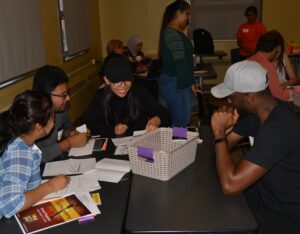At this week’s UWindsor GATAcademy, I had the pleasure of presenting a workshop on “Connecting Best Practices for Teaching Linguistically-Diverse International Students with International Student Satisfaction.” While we presented some of the findings from our recent research on this topic, we did it with a bit of a student spin, which made it fascinating to present.
First, let me acknowledge the work of two students. Miranda Pecoraro, an Outstanding Scholar and 3rd year Social Work student, and Renan Paulino, a MITACS intern from Brazil. They took our research and developed it into a game that permitted participants to engage in both constructivism and experiential learning as they learned about ways we can enhance the teaching and learning of international students. This was the first time we tried it, and from all reports, it went well.
I would also like to commend three other students who served on our expert panel for the game. These students included Victor Sam (Computer Science, Ghana), Sumeet Kaur (Bachelor of Arts-Criminology, India), and Ahuying Zhuo (Law, China). And, of course, our international student advisor, Deena Wang, who was instrumental in organizing the day.

What we did was to build 5 personas representing international students at the University of Windsor and then provide the related teaching practices for each persona to a groups of participants. Each group was asked to select 10 practices (they were given an average of 20 to select from) they thought fit the assigned persona and then defend one of these to the wider group. The expert panel, using green (agree), red (disagree), and yellow (not sure) lollipop signs helped us understand how each teaching practice may or may not be appropriate for the persona. It was a wonderful display of constructivism and experiential learning.
In the end, the GAs and TAs came away from the workshop with a key point. As we approach our students, we need to learn enough about each student to determine what teaching practice will enhance learning, both inside and outside of the classroom. Factors such as country of origin, area of study, length of time studying abroad, and level of study all lead to better understanding of the learning preferences of international students.
This was fun!
-Clayton Smith

Recent Comments